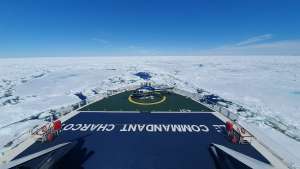The director of the Millennium Institute for Biodiversity of Antarctic and Subantarctic Ecosystems (BASE), Dr. Elie Poulin, with the director of the Millennium Nucleus for the Ecology and Conservation of Temperate Mesophotic Reef Ecosystems (NUTME), Dr. Alejandro Pérez-Matus dived in the Weddell Sea, Antarctica, on a 15-day international expedition that took them to the inhospitable Larsen B ice shelf.
Santiago, January 13, 2023.- The exchange of disciplinary experiences, together with the incorporation of new research methodologies, was the objective of the polar expedition carried out between the centers of excellence of the National Agency for Research and Development (ANID); Millennium Institute for Biodiversity of Antarctic and Sub-Antarctic Ecosystems (BASE) and Millennium Nucleus for the Ecology and Conservation of Temperate Mesophotic Reef Ecosystems (NUTME).

For the director of the BASE Millennium Institute and academic from the University of Chile, Dr. Elie Poulin, the collaboration meant fundamental support in scientific work in the field, and opened up new possibilities for carrying out projects: “In highly demanding conditions, as it is to carry out scientific diving in Antarctica, it is essential to have disciplinary experience that allows operations to be carried out safely and successfully. Therefore, working with NUTME was a fantastic experience, which we hope to be able to repeat again”, he said.
Meanwhile, the director of the Millennium Nucleus for the Ecology and Conservation of Temperate Mesophotic Reef Ecosystems (NUTME), Dr. Alejandro Pérez-Matus, carried out his first polar expedition, diving in waters as low as -1.5°, and incorporating highly complex equipment in the dives: “We carry out sampling of marine invertebrates and fish, having the possibility of using BRUVs (Baited Remote Underwater Video cameras). This allowed us to observe fish and species for longer than during a scuba dive, which is limited by cold to just a few minutes. In addition, we take underwater photographs to characterize the seabed and associated species. Finally, we managed to extract seawater at the depths visited to carry out environmental DNA filtering in the on-board laboratory”, he pointed out.

During the 15-day expedition that both centers of excellence carried out on board the French ship Le Commandant Charcot, and within the framework of an international collaboration between SEDNA Expeditions and the Instituto Milenio BASE, more than 12 dives were made in the cold Weddell Sea, with long hours of daily work.
Marine invertebrates and fish were collected during the dives for genetic studies, along with high-quality photography and video of Antarctic organisms and unexplored underwater environments. Both centers will share their experiences in Antarctica, through scientific dissemination activities that they will announce jointly at https://www.institutobase.cl and https://nutme.cl
By: Direction of Communications Millennium Institute BASE
Main picture: A. Pérez-Matus
